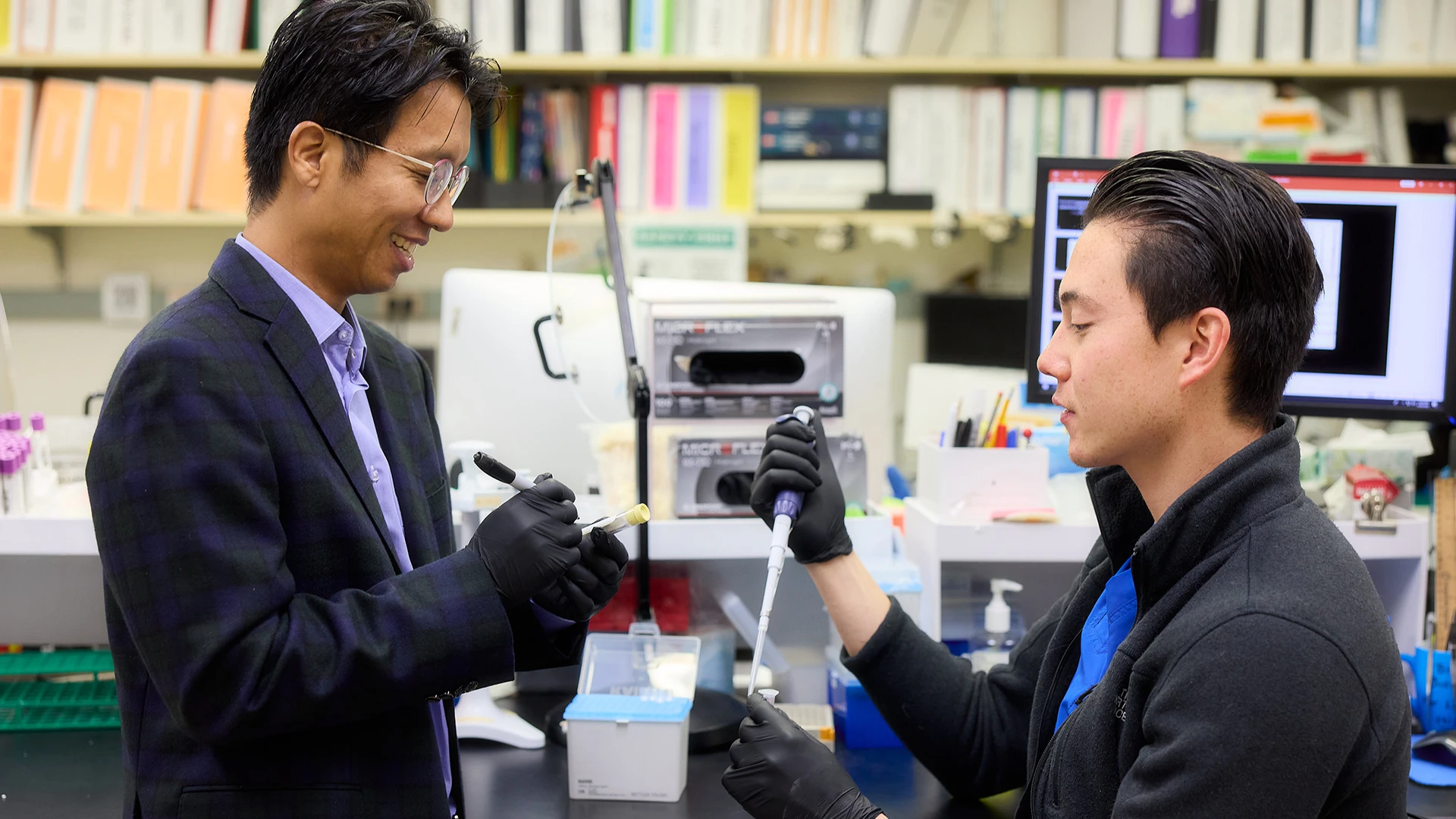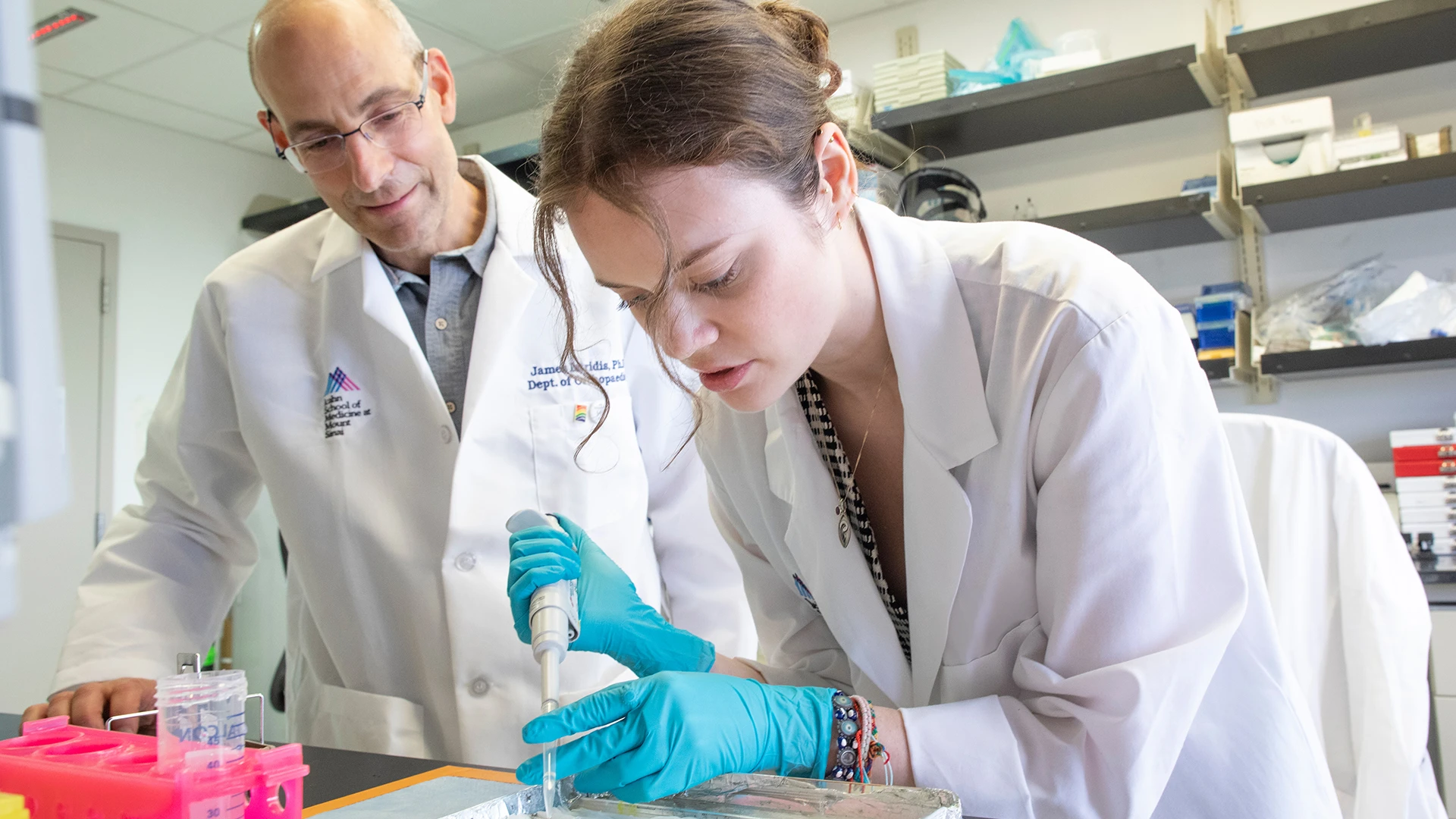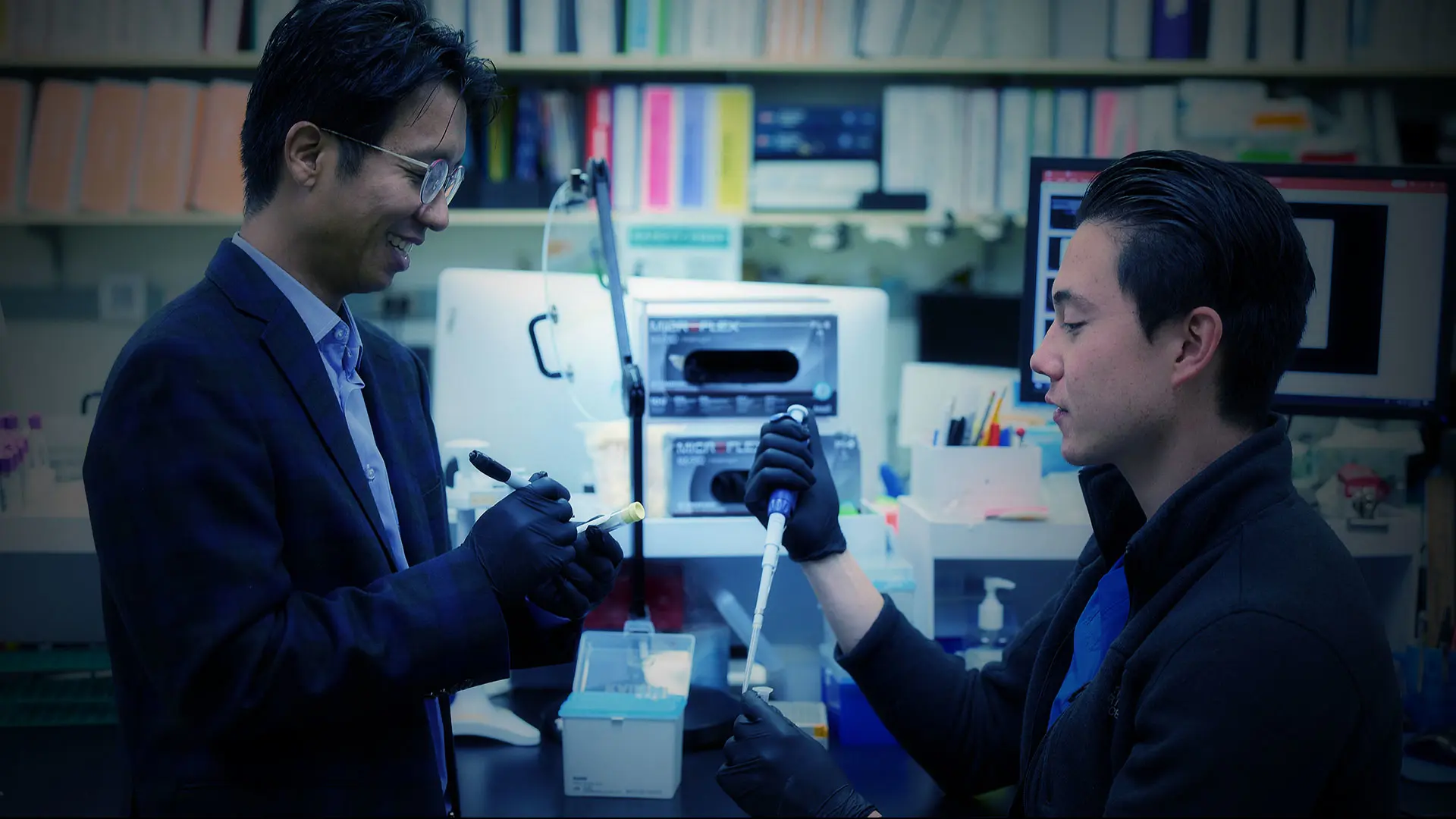An MD-PhD Student Builds His Training Around a Love for Medicine, Music, and Science

From left: Mentor Ron Do, PhD, and Iain Forrest, PhD, MD3.
As lab sessions go, this was likely one of the most offbeat ever undertaken by a team from Mount Sinai’s Graduate School of Biomedical Sciences. Three graduate students, a lab technician, two postdoctoral fellows, and their faculty leader headed underground to a subway platform in New York City to listen to a musically gifted colleague of theirs serenade commuters and tourists alike with the sonorous sounds of his electric cello.
The entertainer was Iain Forrest, PhD, who managed to find time amid a rigorous, eight-year medical-scientist training program to perform as part of the Metropolitan Transit Authority’s Music Under New York Program.
“He genuinely loves playing music in front of people, and especially in front of patients,” says his mentor of the past four years, Ron Do, PhD, the Charles Bronfman Professor in Personalized Medicine and Professor of Genetics and Genomic Sciences at the Icahn School of Medicine at Mount Sinai, who organized the subway outing. “The benefits of music in the field of medicine are well known, helping to reduce stress and promote emotional well-being, and it’s amazing to see how people respond when Iain performs inside and outside the hospital.”
The effusive support that Dr. Do, a distinguished computational geneticist and data scientist, accords his talented student underscores the warm and productive mentor-mentee relationship the two have enjoyed.

Iain Forrest, PhD, MD3, plays the electric cello as part of the Metropolitan Transit Authority’s Music Under New York Program. Photo: Derek Srisaranard
“He has not only invested in me professionally, in my aspirations as a scientist, but in my personal growth and development,” says Dr. Forrest, who received his PhD in Biomedical Sciences (Genetics and Genomic Sciences) from Mount Sinai in May 2023 and has less than two years remaining on his physician track. “I was his first MD-PhD student, so he made the effort to learn as much as he could about how to mentor me by speaking to other physician-scientists and clinicians who became important collaborators and network connections for me as I pursue my career.”
Together, they worked on scientific projects and, in December 2022, they published an online groundbreaking study in The Lancet describing the in silico marker the two created using machine learning and extensive data from electronic health records to characterize, for the first time, the multidimensional nature of coronary artery disease (CAD). In place of the standard binary framework for measuring CAD—which is often prone to misdiagnosis—the innovative new marker shows where the patient exists on a comprehensive spectrum of the disease, accounting for multiple dimensions of the disease, such as plaque buildup and risk for heart failure and arrhythmia.
Not surprisingly, the groundbreaking study was the result of a creative brainstorming and collaborative effort of Dr. Do, senior author, and his lead-author trainee.
As with the prior three studies the two had worked on, this one challenged Dr. Forrest to immerse himself in new scientific realms, such as bioinformatics, statistics, and machine learning.
“We often conversed over coffee about random questions or thoughts we have, and one day the discussion turned to artificial intelligence and how we could use it to improve our clinical understanding of cardiovascular disease and coronary artery disease, since Ron’s training at Harvard was in those fields,” Dr. Forrest recalls. “We were excited by the vast range of clinical outcomes of coronary artery disease we were able to capture with the straightforward tool we built.”
As with the prior three studies the two had worked on, this one challenged Dr. Forrest to immerse himself in new scientific realms, such as bioinformatics, statistics, and machine learning. “This was all novel to me, since my background was completely in molecular and cellular biology, and I had to teach myself how to even begin to understand these complex methodologies,” he acknowledges. “But it wasn’t just self-study. I was fortunate to be able to learn from fantastic collaborators at Mount Sinai who were preeminent bioinformaticians, clinicians, and experts in their fields.”
Dr. Forrest has proven to be a fast learner. “He’s very independent and proactive in seeking solutions and making his own decisions,” says Dr. Do, who is the founding director of the Center for Genomic Data Analytics in The Charles Bronfman Institute for Personalized Medicine. “He’s also incredibly productive and consistently delivers exceptional, high-quality work.”
“Iain is very independent and proactive in seeking solutions and making his own decisions. He’s also incredibly productive and consistently delivers exceptional, high-quality work.”
– Ron Do, PhD
Those traits will certainly serve Dr. Forrest well as he makes plans to merge his evolving skills in genomic medicine and artificial intelligence within his own lab someday to unlock the mysteries of human disease. “We have all these tools, but what’s missing now is the clinical translation of them,” says Dr. Forrest. As a future physician-scientist, he sees himself perfectly positioned to see patients in the clinic—and work tirelessly in the lab to “solve their medical issues through innovative new biomedical solutions and strategies.”
A Neuroscience PhD Student Draws on a Trio of Esteemed Mentors to Sharpen Her Clinical and Technical Skills

From left: Daniela Schiller, PhD; Sarah Banker, who is enrolled in the PhD in Neuroscience program; Xiaosi Gu, PhD; and Jennifer Foss-Feig, PhD.
In pursuit of a PhD in neuroscience degree from Mount Sinai’s Graduate School of Biomedical Sciences, Sarah Banker has had an unparalleled opportunity to engage with three mentors who are acclaimed investigators in their respective clinical and research fields.
She has partnered with all three on a number of published papers where she was lead author, including a much-cited study in Trends in Neuroscience in October 2021 on hippocampal contributions to social and cognitive deficits in autism spectrum disorder (ASD).
“They are true role models for me in so many ways, especially in collaborative science, helping me develop research questions and become more competent and independent as a researcher,” says Ms. Banker, who is set to complete her five-year PhD program in spring 2024. “They’ve also been personal mentors, and I feel I can go to them with anything I’m struggling with and know they’ll have an open door.”
In her first year of graduate school, Ms. Banker rotated through the labs of Daniela Schiller, PhD, Professor of Psychiatry, and Neuroscience, who has advanced the understanding of the neural mechanisms underlying emotional control; Xiaosi Gu, PhD, Associate Professor of Psychiatry, and Neuroscience, and Founding Director of the Center for Computational Psychiatry; and Jennifer Foss-Feig, PhD, Associate Professor of Psychiatry, whose research into the etiology of autism and other neurodevelopmental disorders has been recognized nationally.
“They are true role models for me in so many ways, especially in collaborative science, helping me develop research questions and become more competent and independent as a researcher.”
– Sarah Banker, Neuroscience PhD student
Ms. Banker decided to select each as a mentor at a time when she was researching a review paper during a first-year class that coincided with her interests in autism and social behavior—and just as her advisors were receiving a grant to jointly explore ASD through the application of advanced computational and neuroimaging tools. The review paper they produced had found strong evidence for the involvement of the hippocampus in autism and encouraged researchers to actively explore this understudied area. From that project emerged the Trends in Neuroscience paper.
“Sarah had the maturity, the scientific capability, and the motivation to drive this project, which tried to push the field of autism research to think about the complex social behaviors and interactions of individuals with autism,” says Dr. Gu. “She knew exactly what she wanted to study, which is pretty rare for a student at this stage of their training.”
Dr. Schiller was also impressed with the “intellectual rigor, curiosity, and very organized thinking” of her graduate student. “She has a full picture of the project and doesn’t get lost in details.” She also recalled a conference in Chicago where Ms. Banker served on a discussion panel with other postdoctoral and senior-level investigators. “Sarah was so confident and articulate in responding to the many questions from the audience that people forgot she was a trainee,” Dr. Schiller says.
An invaluable part of Ms. Banker’s training was her rotation in the lab of Dr. Foss-Feig, located in the Seaver Autism Center for Research and Treatment, known internationally for its leading research and personalized care for individuals with autism and related disorders. “Joining my lab gave her direct clinical exposure, rather than just studying autism conceptually,” explains Dr. Foss-Feig. “By interacting with people with autism, she gets to understand their ability to navigate social directions, for example, and to be part of the clinical conversations about patients we see at the Center.”
No less important to Ms. Banker has been the ability to lean on the neuroimaging expertise of each of her mentors, and to tap into the extraordinary resources of Mount Sinai’s BioMedical Engineering and Imaging Institute. The Center for Computational Psychiatry has also provided a sharp technology edge to Ms. Banker’s training, “allowing me to present my work to leading experts in the field and get both valuable advice and troubleshooting help,” she says.
“I’ve benefitted from three amazing mentors who have taught me so much about collaborative science and about combining computational and clinical expertise in a way I don’t think I could have done anywhere else.”
– Sarah Banker, Neuroscience PhD student
The multidimensional experience of the past four and a half years has encouraged Ms. Banker to remain at Mount Sinai for her postdoctoral studies to further explore the nexus of autism spectrum disorder and social behaviors. Here again, her mentors are providing steadfast support, working to get funding for her ongoing work.
“I’ve benefitted from three amazing mentors who have taught me so much about collaborative science and about combining computational and clinical expertise in a way I don’t think I could have done anywhere else,” says Ms. Banker.
After Excelling as a Master’s Student, Denise Iliff Has a Full-time Position in Spine Research With a Legendary Mentor

Denise Iliff, MSBS, with mentor James Iatridis, PhD, in the Iatridis Spine Bioengineering Lab.
The Iatridis Spine Bioengineering Lab, which is part of the Orthopaedic Research Laboratories at the Icahn School of Medicine at Mount Sinai, is renowned for its work on developing early and minimally invasive treatments for discogenic back pain, as well as regenerative medicine strategies for intervertebral disc repair.
It is led by James Iatridis, PhD, Mount Sinai Endowed Chair in Orthopedic Research, Vice Chair for Research, and Director of Spine Research in the Leni and Peter W. May Department of Orthopedics at Icahn Mount Sinai.
Denise Iliff first worked in the lab when she was studying for her Master of Science in Biomedical Science (MSBS) degree at Icahn Mount Sinai’s Graduate School of Biomedical Sciences, where she had outstanding opportunities to conduct research with top Mount Sinai scientists and present her award-winning work at conferences. When she graduated in 2023, Dr. Iatridis hired her as a full-time research assistant in his lab.
“Denise is now working on our discogenic pain project where she is learning about spinal cord changes following an intervertebral disc injury,” says Dr. Iatridis. “Working with our team, Denise has characterized important neuroinflammatory and astroglial changes in the spinal cord that are likely contributors to acute and chronic pain. We will use this information to better understand disc degeneration and to develop new treatment strategies for early- and late-stage back pain.”
In a joint research project with a team from Rush University, Ms. Iliff is also studying pain-like behavioral measurements in rats to assess pain responses following injury. She is currently working on a manuscript, which builds on her master’s thesis, about the kinetic changes in acute and chronic pain following injury to the intervertebral disc (IVD) in multiple tissues, including the spinal cord.
Looking ahead, Ms. Iliff expects to use the validation of the behavioral measurements and the results from her kinetics study to begin a treatment study for acute vs. chronic disc degeneration. The goal, she says, is to target early inflammation and late chronic remodeling and use immunohistochemistry, pain behavior measurements, and IVD morphology to assess the effectiveness of treatments.
“Denise’s teamwork skills, contagious enthusiasm for science, and passion to improve health care for individuals make her a wonderful addition to the lab, and a perfect fit for Mount Sinai.”
– James Iatridis, PhD
At the lab, Ms. Iliff has had a wide range of research and publishing opportunities. “I’m learning a lot about research and publishing in professional journals,” she says. “I have had the opportunity to conceptualize studies and see them through from beginning to end and to navigate the process of writing a transcript and getting it published, and all that entails.” As a student, she made presentations at the annual meeting of the Orthopaedic Research Society in Dallas, and the Philadelphia Spine Research Symposium, where she won awards for her research and presentations.
“I was eager to offer Denise a full-time position because she was an outstanding MSBS student who contributed to multiple papers and won student paper awards at international scientific conferences,” says Dr. Iatridis. “Denise’s teamwork skills, contagious enthusiasm for science, and passion to improve health care for individuals make her a wonderful addition to the lab, and a perfect fit for Mount Sinai.”
“I never thought I would be a scientist or get so into science, but now, I can’t imagine my future without it.”
– Denise Iliff, MSBS
Ms. Iliff, who ultimately plans to apply to physician assistant school, says: “I never thought I would be a scientist or get so into science, but now, I can't imagine my future without it. I want to find a way to implement research into whatever I do.”
